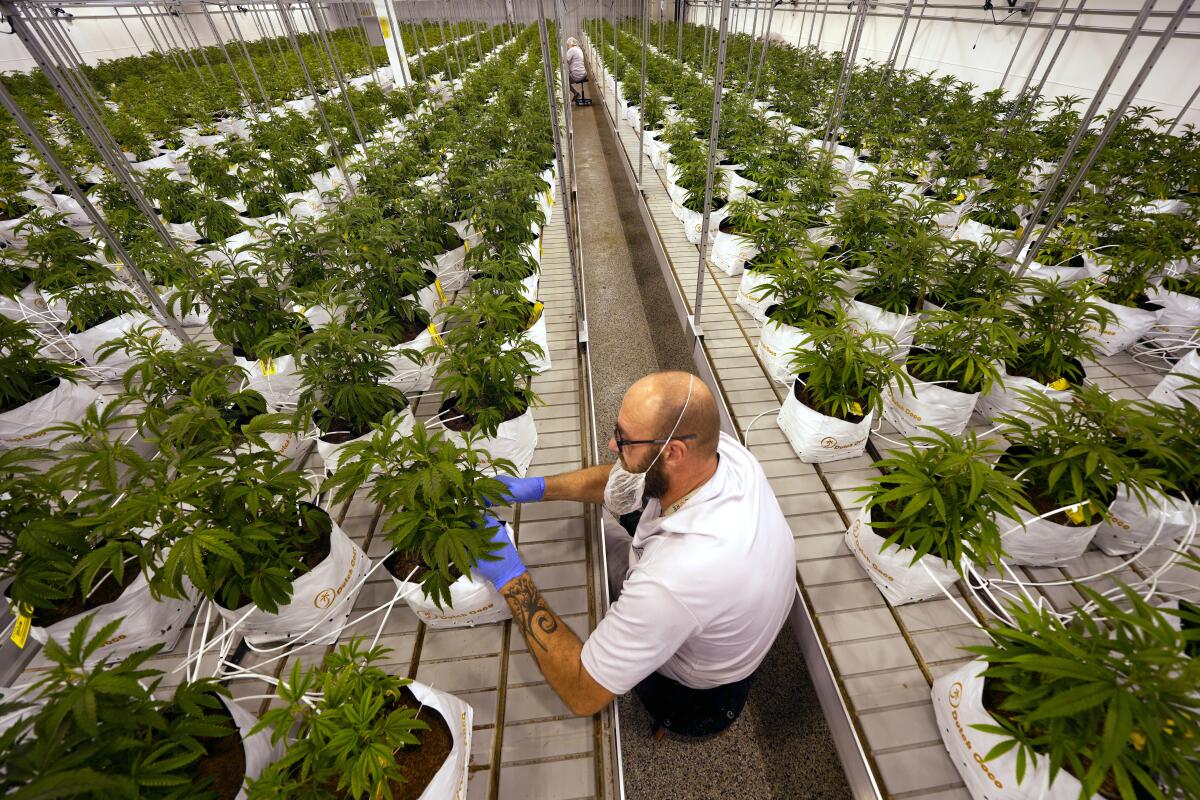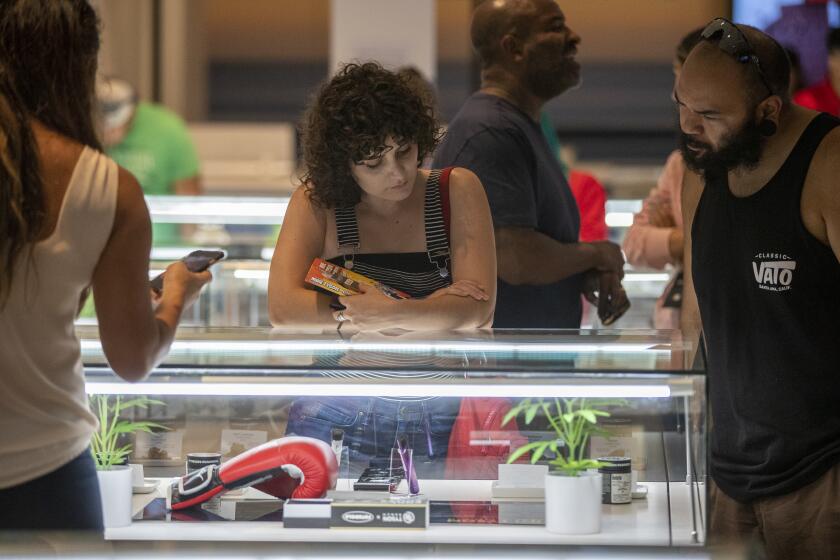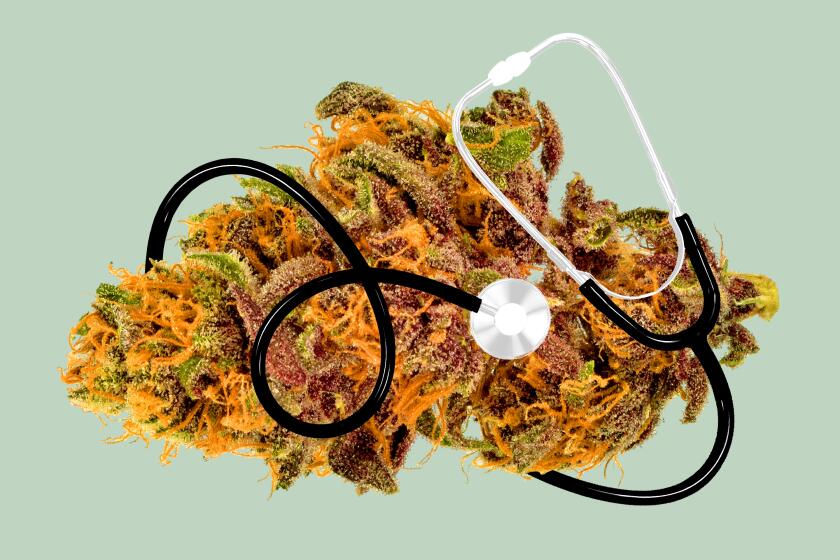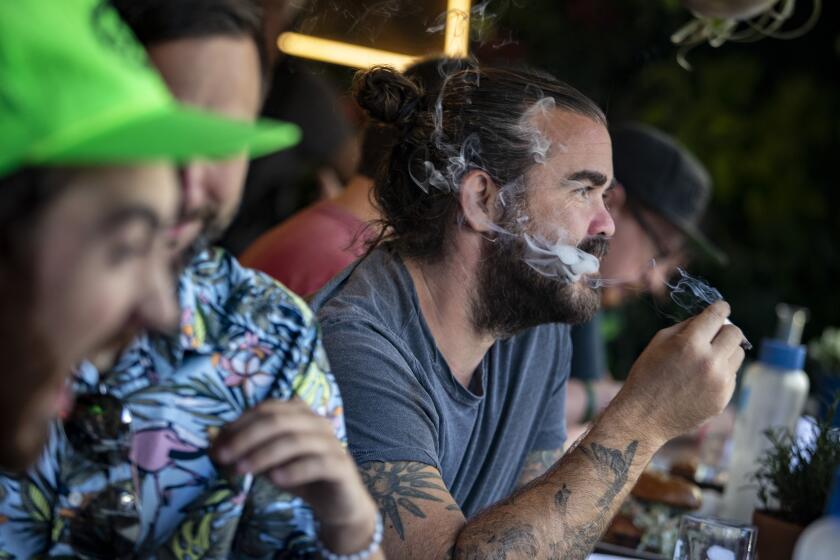Recreational marijuana approved in Maryland and Missouri but rejected in 2 other states

- Share via
LITTLE ROCK, Ark. — Voters approved recreational marijuana in Maryland and Missouri, signaling gradually growing support for legalized pot even in conservative parts of the country, but similar measures were rejected in Arkansas and North Dakota.
Tuesday’s partial election results mean that at least 21 states have now approved marijuana’s recreational use. A similar initiative went before voters in South Dakota, but it was too early to call early Wednesday.
Advocates said the results send a message to lawmakers in Washington about increasing support around the country for legalization.
“A growing number of voters recognize that cannabis policy reform is in the best interest of public health and safety, criminal justice reform, social equity, and personal freedom,” Toi Hutchinson, president and CEO of the Marijuana Policy Project, said in a statement. “State-level legalization victories are what’s necessary to move the needle forward at the federal level.”
The state voting follows moves by President Biden toward decriminalizing marijuana. Biden last month announced that he was pardoning thousands of Americans convicted of simple possession of marijuana under federal law.
Advocates of the marijuana initiatives have said Biden’s announcement could give a boost to their efforts.
People with substance use disorders, such as Aaron Carter, who died last week, have embraced the idea that they can get high and be sober
Missouri’s measure will legalize recreational marijuana for adults 21 and older and expunge records of past arrests and convictions for nonviolent marijuana offenses, except for selling to minors or driving under the influence.
“It just shows that this is not a partisan issue,” said John Payne, who led the Missouri campaign to legalize marijuana use. “This is something that transcends partisan divides.”
Payne said he expected recreational sales to start in Missouri early next year.
Opponents said they would be working to limit the implementation of Missouri’s legalization, such as working with cities and towns to opt out of allowing dispensaries.
Years after California legalized cannabis with Proposition 64, some supporters say it has not met expectations, while those who opposed the initiative say it has proved worse than they feared.
“The devil is in the details, and we will remain actively involved in Missouri implementation because we don’t need another Big Tobacco industry harming kids in Missouri,” said Kevin Sabet, president of SAM Action, an anti-legalization group.
Maryland will also make changes in criminal law and create automatic expungements of past marijuana possession convictions.
Heading into the election, recreational marijuana was legal in 19 states, and polls have shown opposition to legalization softening. All of the states with recreational marijuana on the ballot, except for Maryland, voted for then-President Trump in the 2020 presidential election.
About 6 in 10 voters support legalizing the recreational use of marijuana nationwide, according to VoteCast, an extensive survey of more than 90,000 voters nationwide conducted for the Associated Press by NORC at the University of Chicago.
Compassionate cannabis donations are a plant medicine lifeline for military veterans and trauma survivors.
The five states that held votes Tuesday have legal medical marijuana programs. That includes Arkansas, which in 2016 became the first Bible Belt state to approve medical marijuana. The state’s dispensaries opened in 2019, and more than 91,000 patients have cards to legally buy marijuana for medical conditions.
The legalization campaigns raised about $23 million in the five states, with the vast majority in Arkansas and Missouri. More than 85% of contributions in those two states came from donors associated with companies holding medical marijuana licenses, according to an Associated Press analysis of the most recent campaign finance reports.
In Arkansas, supporters ran upbeat ads touting the thousands of jobs they said would be created by the measure. Opponents ran more ominous spots, warning voters to “protect Arkansas from big marijuana.”
The initiative drew criticism from traditional legalization opponents as well as some medical marijuana advocates, who said the Arkansas proposal placed too many limits and would benefit only a handful of dispensaries. Republican Gov. Asa Hutchinson, a former head of the federal Drug Enforcement Administration, also opposed the measure.
News Alerts
Get breaking news, investigations, analysis and more signature journalism from the Los Angeles Times in your inbox.
You may occasionally receive promotional content from the Los Angeles Times.
Supporters indicated they planned to try again in Arkansas.
David Owen, who led North Dakota’s legalization effort, said he wasn’t sure another effort would be made after the proposal was rejected.
“Tonight was not what we wanted, but the people have spoken and we have to prepare for the next steps,” Owen said.
North Dakota’s proposal would have allowed people 21 and older to legally use marijuana at home as well as possess and cultivate restricted amounts of cannabis. It also would have established policies to regulate retail stores, cultivators and other types of marijuana businesses.
The incumbent governor refuses to budge on pot legalization. His rival Beto O’Rourke wants to legalize it and expunge convictions. Nov. 8 will test where voters stand.
South Dakotans, including a sizable number of Republicans, voted to legalize marijuana possession in 2020, but that law was struck down by the state Supreme Court, in part because the proposal was coupled with medical marijuana and hemp. This year, recreational pot stood by itself as it went before voters.
In Colorado, where recreational marijuana has been legal for nearly a decade, voters Tuesday took up a proposal that would allow the use of certain psychedelic substances. If approved, it would make Colorado the second state to take such a step. The vote was too early to call early Wednesday.
More to Read
Get the L.A. Times Politics newsletter
Deeply reported insights into legislation, politics and policy from Sacramento, Washington and beyond. In your inbox three times per week.
You may occasionally receive promotional content from the Los Angeles Times.














